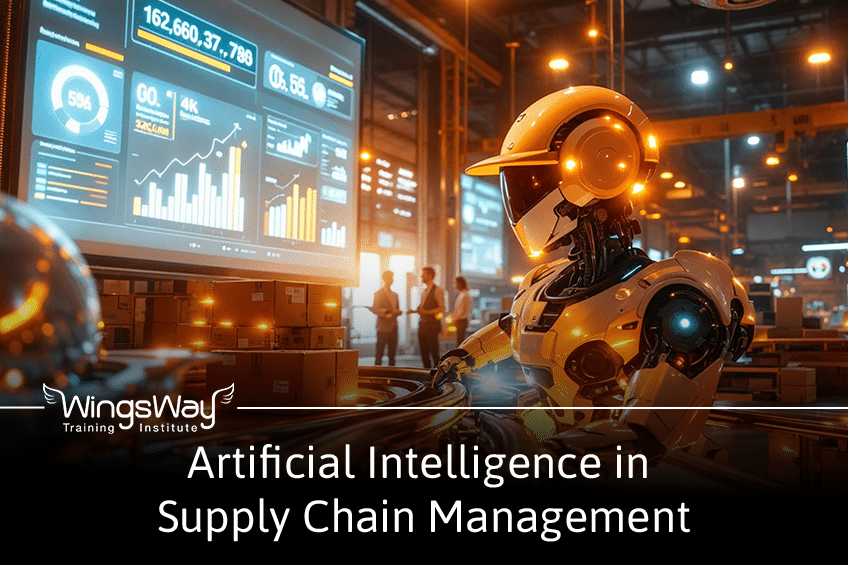
Artificial Intelligence in Supply Chain Management in 2025
It’s Friday night. You’re hungry, craving a hot pizza, and you place an order online. On the app, you can see when your order is received by the restaurant when they’ve started preparing it, when the delivery executive has reached the restaurant, and the time it will take to reach you.
Isn’t it just amazing to know the status of your order in real time?
Behind the scenes, these real-time updates are possible through a complex dance of Artificial Intelligence (AI) that is working to ensure your pizza arrives hot, fresh, and on time.
Just a decade ago, this process was manual and inefficient. Today, advanced AI algorithms have transformed every aspect of the delivery process, from predicting ingredient needs to optimising delivery routes and managing inventory with unprecedented precision.
Artificial Intelligence in Supply Chain
AI isn’t just a buzzword anymore; it’s a resource that is reshaping jobs and industries worldwide. Supply chain management is no different.
As businesses strive to become more efficient, and predictive, while improving customer satisfaction, AI emerges as a transformative force, streamlining operations and revolutionising traditional and manual methods.
But why is AI so important in today’s logistics environment?
Let’s explore this fascinating intersection of technology and supply chain management. In this comprehensive article, we will also cover some of its benefits and challenges, explore three successful case studies of companies using AI to optimise their supply chains and give some key strategies and tips to implement AI in supply chain management.
Understanding Supply Chain Management
Before diving into the role of AI, it’s essential to grasp the basics. What is supply chain management exactly?
Supply chain management involves overseeing the flow of goods and services, from raw material sourcing to delivery to end customers. Key components of supply chain management include planning, sourcing, production, delivery, and returns.
A robust supply chain ensures that products are delivered at the right time, in the right quantity, and at the right price with minimal waste or damage.
What is Artificial Intelligence?
AI refers to the simulation of human intelligence in machines that are programmed to think and learn like humans. This includes the ability to reason, learn from experiences, and adapt to new inputs.
Although the history of AI dates back to the mid-20th century, it has seen exponential growth in recent years, primarily due to advancements in data analytics and processing power.
With the popularity of generative AI techs like ChatGPT, Gemini, and CoPilot in 2022-23, everyone could get a taste of the possibilities of what AI could do while sitting at home!
Historical Background of AI in Supply Chain
AI didn’t just appear overnight in the supply chain sector. It began in the 1960s with basic computer systems replacing manual record-keeping. Early inventory tracking methods paved the way for more sophisticated technologies to come later.
The 1980s introduced enterprise resource planning (ERP) systems, that helped businesses to predict inventory needs and optimise production. Material Requirements Planning (MRP) became a standard tool for strategic resource management.
Internet connectivity in the 1990s revolutionised supply chain operations. Retailers like Walmart used early data analytics to track product movement and improve inventory management, creating a foundation for more intelligent systems.
The Technological Landscape of AI in Supply Chains
The integration of artificial intelligence into supply chain management represents a revolutionary shift that is reshaping how our supply chains operate. Predictive analytics now serves as a sophisticated crystal ball for modern logistics, analysing complex datasets that include historical sales information, seasonal trends, social media sentiment, and even weather patterns.
These intelligent systems can forecast demand with remarkable accuracy, predict potential supply chain disruptions, and optimise inventory levels in real-time. All these are critical markers that ensure that resource wastage is minimal, and processes are optimised.
Robotic process automation or RPA has transformed warehouses from traditional human-operated spaces into high-tech innovation centers. Companies like Amazon and Alibaba have led the charge, deploying hundreds of thousands of mobile robots that work alongside human employees.
These automated systems can process tens of thousands of orders per hour, dramatically increasing operational efficiency and reducing human error.
Benefits of AI in Supply Chain
So, should you consider investing in AI? The answer seems like a resounding “yes!” Let’s summarise all the benefits in 5 points:
- Enhanced Decision-Making Capabilities: AI processes large volumes of data faster, offering insights that lead to informed decisions.
- Improved Inventory Management: With predictive analytics, businesses can optimise stock levels, reducing waste and shortages.
- Demand Forecasting Accuracy: AI algorithms can analyse market trends more accurately than traditional methods.
- Increased Operational Efficiency: Automating processes reduces manual effort, which means faster operations.
- Cost Reduction Strategies: AI systems can recommend cost reduction strategies and cut manual processes significantly, leading to efficient use of resources and reduced errors.
Drawbacks and Challenges of AI in Supply Chain
Despite its many advantages, implementing AI isn’t without its challenges:
- Implementation Challenges: Integrating AI into existing systems often requires significant time and financial investment. Smaller organisations may not have the funds or workforce to implement it.
- Data Privacy Concerns: With vast amounts of data being processed, safeguarding information is paramount. If it is not done correctly and with the right tool, investing in AI tools may put your company’s data at risk.
- Skill Shortages in AI and Data Analytics: Since AI is still relatively new, the global workforce is still not equipped enough to handle the ever-changing demand for skills around AI.
- Dependence on Technology: Over-reliance on AI might lead to business vulnerabilities, particularly during system failures.
Successful Use Cases of AI in Supply Chain
Let’s take a look at 3 notable, real-world applications of AI in supply chain management that have enabled these conglomerates to become as efficient as they are today:
Amazon: Pioneering AI-Driven Logistics
Amazon’s AI implementation represents the pinnacle of modern supply chain automation.
- Their warehouse management system employs over 350,000 mobile robots working alongside humans, processing millions of packages daily.
- The company’s AI algorithms optimise storage locations by predicting which products will be ordered together, reducing picking time by 50%.
- Their delivery route optimisation saves approximately $10 million annually in fuel costs.
- Amazon’s AI predicts product demand with 95% accuracy, enabling them to position inventory strategically across their fulfillment network. Recent implementations include AI-powered drone delivery systems and predictive equipment maintenance, reducing warehouse downtime by 60%.
Coca-Cola: AI-Powered Demand Forecasting
Coca-Cola transformed its supply chain by implementing AI-driven demand forecasting across 200+ countries.
- Their system analyses 600+ variables including weather patterns, local events, and social media trends to predict beverage demand. This implementation reduced forecast errors by 30% and inventory costs by $100 million annually.
- It optimises recipe formulation, ensuring consistent taste while reducing ingredient waste by 20%.
- Their vending machine network uses machine learning to adjust stock levels and maintenance schedules, increasing machine uptime by 15% and reducing restocking costs by 40%.
Unilever: Data-Driven Supply Chain Excellence
Unilever’s AI implementation spans its entire supply chain network, connecting 300+ factories and 500+ warehouses.
- Their digital twin technology creates virtual replicas of manufacturing facilities, enabling real-time optimisation and reducing production downtimes by 25%.
- The company’s AI algorithms analyse consumer behaviour patterns across 400 brands, adjusting production schedules dynamically. Their sustainable logistics program, powered by AI, has reduced carbon emissions by 40% through optimised transportation routes.
- Recent innovations include AI-powered quality control systems that have reduced product defects by 35% and predictive maintenance saving $50 million annually in repair costs.
Future Trends of AI in Supply Chain
Looking ahead, these are some of the trends that will shape the future of AI in supply chains:
- Increased Automation in Warehouses: Expect more robots handling logistics tasks, improving transporting and storing efficiency.
- Enhanced Real-Time Data Analytics: Companies will rely more on real-time insights, allowing for quicker decision-making.
- Blockchain Integration with AI: This combination will enhance security and transparency in supply chains.
- Sustainability Initiatives Driven by AI: AI can help track resource use and suggest more eco-friendly practices.
Implementation Strategies for AI in Supply Chain
To successfully integrate AI into supply chains, you should consider these strategies:
How Procurement Managers can use AI
-
-
- Use AI to analyse supplier performance and risk
-
-
-
- Automate vendor selection through predictive analytics
-
-
-
- Develop intelligent negotiation strategies using historical data
-
-
-
- Identify cost-saving opportunities through comprehensive market analysis
-
How Inventory Managers can use AI
-
-
- Implement machine learning for demand forecasting
-
-
-
- Create dynamic inventory optimisation models
-
-
-
- Predict potential stockouts before they occur
-
-
-
- Develop real-time inventory tracking systems
-
-
-
- Minimise carrying costs through precise stock-level management
-
How Logistics Coordinators can use AI
-
-
- Optimise delivery routes using AI algorithms
-
-
-
- Predict potential transportation disruptions
-
-
-
- Implement intelligent route planning
-
-
-
- Reduce fuel consumption through smart routing
-
-
-
- Enhance fleet management with predictive maintenance
-
How Supply Chain Analysts can use AI
-
-
- Develop comprehensive data visualisation dashboards
-
-
-
- Use AI to identify hidden patterns in supply chain performance
-
-
-
- Create predictive models for market trends
-
-
-
- Perform advanced risk assessment using machine learning
-
-
-
- Generate actionable insights from complex datasets
-
How Warehouse Managers Can Use AI
-
-
- Implement robotic process automation
-
-
-
- Use AI for intelligent warehouse layout optimisation
-
-
-
- Develop smart picking and sorting systems
-
-
-
- Enhance worker safety through predictive risk analysis
-
-
-
- Optimise storage space utilisation
-
Here are some key tips and strategies that the organisation must consider overall:
-
-
- Tip #1: Start with specific, measurable problems, then find a tool that solves them.
-
-
-
- Tip #2: Invest in comprehensive staff training to use the AI tools before implementing them.
-
-
-
- Tip #3: Develop robust data management and protection practices to safeguard confidential data.
-
-
-
- Tip #4: Begin with pilot programs.
-
-
-
- Tip #5: Continuously monitor and adjust AI systems to mould them to your requirements.
-
-
-
- Tip #6: Foster a culture of technological adaptation by promoting the learning and development of employees.
-
Optimise Your Supply Chain with AI and WingsWay
AI is not just an accessory in supply chain management; it’s becoming necessary. By enhancing efficiencies, improving decision-making, and driving cost savings, AI is reshaping how companies operate. As technology continues to evolve, those who adapt and incorporate AI into their supply chains will be positioned to lead in the marketplace.
Don’t risk being left behind in the AI revolution. Join WingsWay’s Supply Chain courses and master the skills that will define the future of logistics. Our industry-recognised certification program offers hands-on experience with cutting-edge AI tools and real-world projects. Learn from experts who’ve implemented AI solutions at companies like Amazon and Unilever. Avail your free demo class for a course of your choice today.
FAQs
What is the primary role of AI in supply chain management?
AI in supply chain management enhances decision-making processes, optimises logistics, and improves forecasting accuracy.
How does AI help in demand forecasting?
AI analyses historical data and market trends, allowing companies to predict supply needs more accurately.
What companies are leading in AI supply chain innovations?
Companies like Amazon, Coca-Cola, and Unilever are at the forefront of AI integration in supply chains.
What are some risks associated with AI in supply chains?
Risks include data privacy issues, dependency on technology, and challenges in implementation.
How can small businesses implement AI in their supply chains?
By starting with pilot projects, identifying specific needs, and training staff, small businesses can effectively adopt AI technologies.



